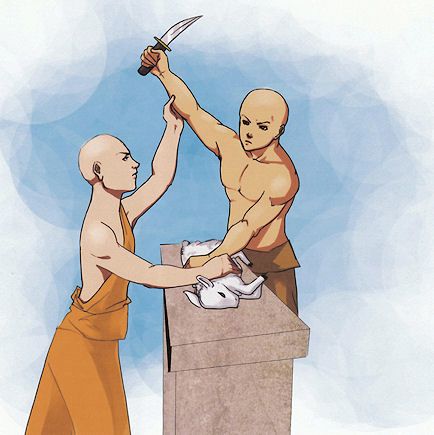
Xīdá-duō could stand this no more, and he rushed to stop them.
Drawing by Kari Francis, Sixth College (UCSD), Class of 2011, by permission
One day Xīdá-duō left the town of Wángshè with a group of holy men (xiānrén 仙人) and ascetics (xiūdàozhě 修道者). Suddenly a cloud of dust on the hillside attracted their attention and they saw a great herd of goats and sheep. Trailing along behind there came a little lamb, who was injured and bleeding, and who was struggling to catch up with the others.
Xīdá-duō picked up the lamb and hurried to bring it to the shepherd, who told him that the whole flock was bound for town to be used by the local king in sacrifices. Xīdá-duō decided to go along, carrying the lamb.

When they reached the sacrificial location in the palace, they found an assembly of ascetics who had left their families. They were singing songs of praise to various gods around a great fire, as they prepared to sacrifice the sheep and goats.
Just when they were ready to kill the first animal, Xīdá-duō could stand this no more, and he rushed to stop them. Everyone was horrified at his interrupting a ritual in this way, none less than King Pínpó-suōluó. But Xīdá-duō addressed them all, arguing them that no real god would rejoice at his worshippers taking the lives of innocent animals, which could never be restored.
"The pain of birth, old age, sickness, and natural death are surely suffering enough for any creature," said Xīdá-duō. "How can one seek to create yet more suffering? Further, if one expects compassion, one must offer compassion (cíbēi 慈悲), for such is the law of cause and effect (yīnguǒ 因果)."
Xīdá-duō was characteristically so eloquent and so persuasive, that everyone was very moved and all converted to his point of view. Again king Pínpó-suōluó invited him to remain in his palace in Wángshè so that he could continue to teach the people about mercy. And again Xīdá-duō politely declined, since he had not yet realized his goal of achieving True Awakening (zhèngjué).